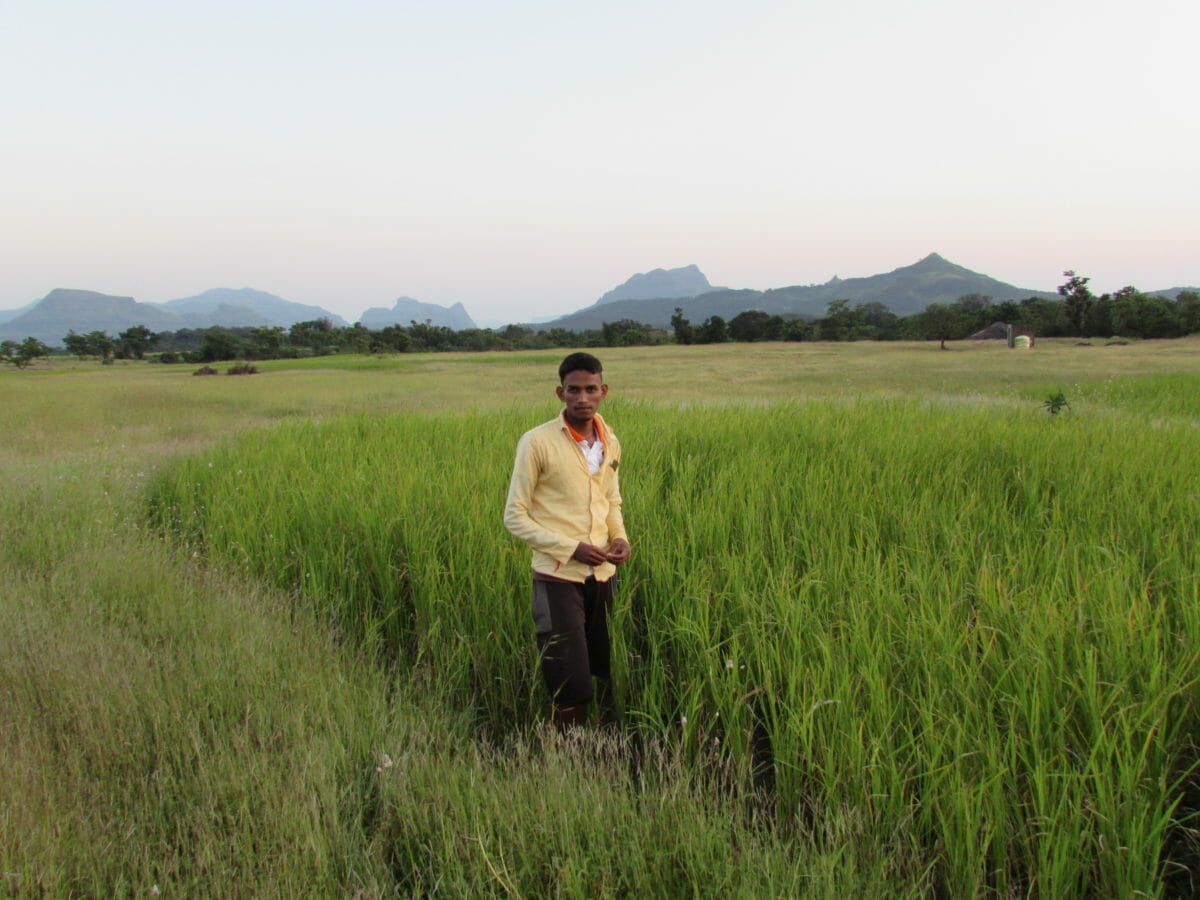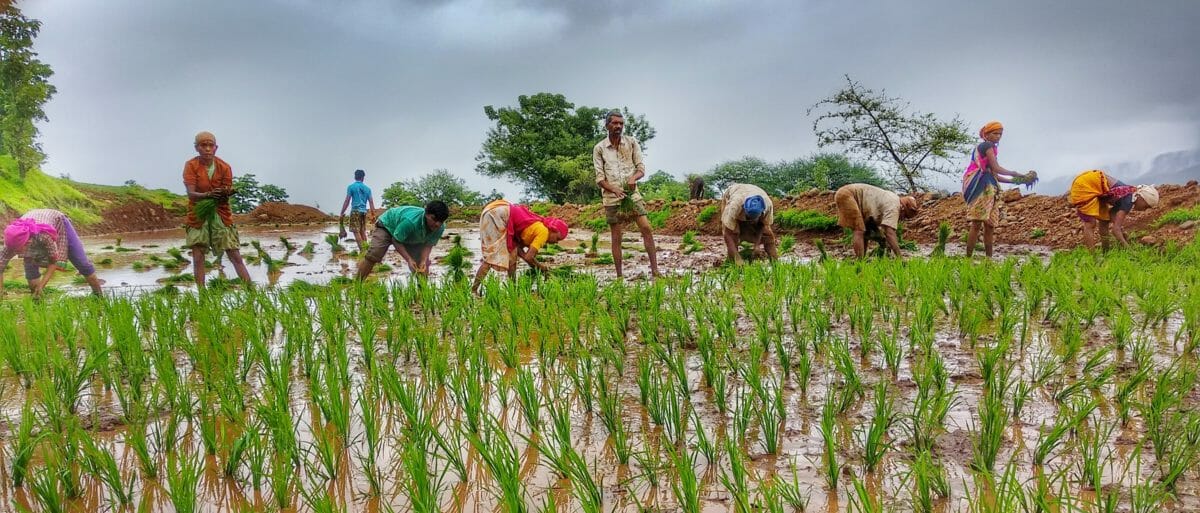How An Indian Farming Organization Is Trying to Save the Forest
OOO Farms trains more than 500 local farmers to follow sustainable practices and gives them indigenous seeds for free.
How An Indian Farming Organization Is Trying to Save the Forest
OOO Farms trains more than 500 local farmers to follow sustainable practices and gives them indigenous seeds for free.

Navnath Maruti, a tribal farmer who is using seeds from OOO Farms, stands in a field of Ambemohar rice in the Sahyadris.by Tariq Engineer
A couple of years ago, four friends gave up their comfortable jobs in Mumbai to form OOO Farms in the Sahyadri hills of western India.
The foursome (made up of Shailesh Awate, Abhay Bhatia, Pranav Khandelwal and Karan Khandelwal) wanted to do something about the growing deforestation taking place in the area. Awate has trekked the hills of this biodiversity hotspot since he was a young boy, and he had grown concerned about the issue.
After a little research, they realized that the local tribes who used to forage for food and practice subsistence farming were now growing produce to sell to urban markets. This was largely the result of road construction that began a couple of decades ago and linked these villages to Mumbai and the rest of the state. In order to grow their crops in paddies, the tribes were cutting down trees and clearing vast swathes of the forest. They had abandoned their traditional farming methods and were using government-provided hybrid seeds, fertilizer and pesticides that were damaging local ecology. “We realized these hybrid seeds were the villain. They had destroyed the crop diversity,” Awate said.
Looking to combine sustainable agriculture and environmental protection, the friends’ first attempt to tackle deforestation was to plant 500 saplings. Awate says only two survived and the rest were eaten by domesticated animals. Then they tried offering the hill tribes money to stop cutting down trees, but that didn’t work either. The four men then spent two months in 2017 criss-crossing the Sahyadris, covering more than 28,000 miles by Awate’s estimation, to soak up all they could about traditional farming practices and indigenous seeds.
Part of the solution OOO Farms came up with was to sell wild food villagers foraged in the forests to businesses in Mumbai. The centerpiece of this strategy is a collaboration with Bombay Canteen, a high-end restaurant in the city, in which OOO acts as the middleman between the tribes and the restaurant. The eatery has agreed to buy as much wild food as the tribespeople can provide (and all of the money goes back to the tribes). OOO also organizes wild food events in Mumbai where the tribes sell their foraged produce directly to consumers.
Awate says this gives the tribes an incentive to regrow and protect the forest, as wild greens need forest cover to grow. It also gives villagers regular income throughout the year so that they don’t necessarily need to expand their farms.
With support from BAIF Development Research Foundation, which aims to provide a sustainable livelihood to the rural poor through climate-resilient agriculture, OOO also started growing crops using native seeds, and it encouraged the local farmers to use them.
OOO trains farmers to follow sustainable practices and provides indigenous seeds for free, along with organic fertilizers. Today, OOO Farms works with more than 500 farmers in 30 villages and grows 30 varieties of indigenous grains and more than 100 types of wild food. So far, it has distributed three tons of seeds, sold 25 tons of produce and 700 kilograms of wild food. The organization sells its own produce at farmers’ markets in Mumbai, food events and on its website.

Navnath Maruti, a 21-year-old tribal farmer living in the Sahyadris, uses seeds from OOO Farms. “If there was too much water, or too little, the [government seed] crop would be ruined,” he said. “That is not the case with the native seeds.” During a visit to Janewadi village in October, Maruti said the forest used to extend past their land, which is now almost devoid of tree cover. “In the last 10 years, people have been cutting down or burning the trees,” he said. “We need to save what’s left.”
Follow us
This work is licensed under a Creative Commons Attribution-NoDerivatives 4.0 International License.
Want to republish a Modern Farmer story?
We are happy for Modern Farmer stories to be shared, and encourage you to republish our articles for your audience. When doing so, we ask that you follow these guidelines:
Please credit us and our writers
For the author byline, please use “Author Name, Modern Farmer.” At the top of our stories, if on the web, please include this text and link: “This story was originally published by Modern Farmer.”
Please make sure to include a link back to either our home page or the article URL.
At the bottom of the story, please include the following text:
“Modern Farmer is a nonprofit initiative dedicated to raising awareness and catalyzing action at the intersection of food, agriculture, and society. Read more at <link>Modern Farmer</link>.”
Use our widget
We’d like to be able to track our stories, so we ask that if you republish our content, you do so using our widget (located on the left hand side of the article). The HTML code has a built-in tracker that tells us the data and domain where the story was published, as well as view counts.
Check the image requirements
It’s your responsibility to confirm you're licensed to republish images in our articles. Some images, such as those from commercial providers, don't allow their images to be republished without permission or payment. Copyright terms are generally listed in the image caption and attribution. You are welcome to omit our images or substitute with your own. Charts and interactive graphics follow the same rules.
Don’t change too much. Or, ask us first.
Articles must be republished in their entirety. It’s okay to change references to time (“today” to “yesterday”) or location (“Iowa City, IA” to “here”). But please keep everything else the same.
If you feel strongly that a more material edit needs to be made, get in touch with us at [email protected]. We’re happy to discuss it with the original author, but we must have prior approval for changes before publication.
Special cases
Extracts. You may run the first few lines or paragraphs of the article and then say: “Read the full article at Modern Farmer” with a link back to the original article.
Quotes. You may quote authors provided you include a link back to the article URL.
Translations. These require writer approval. To inquire about translation of a Modern Farmer article, contact us at [email protected]
Signed consent / copyright release forms. These are not required, provided you are following these guidelines.
Print. Articles can be republished in print under these same rules, with the exception that you do not need to include the links.
Tag us
When sharing the story on social media, please tag us using the following: - Twitter (@ModFarm) - Facebook (@ModernFarmerMedia) - Instagram (@modfarm)
Use our content respectfully
Modern Farmer is a nonprofit and as such we share our content for free and in good faith in order to reach new audiences. Respectfully,
No selling ads against our stories. It’s okay to put our stories on pages with ads.
Don’t republish our material wholesale, or automatically; you need to select stories to be republished individually.
You have no rights to sell, license, syndicate, or otherwise represent yourself as the authorized owner of our material to any third parties. This means that you cannot actively publish or submit our work for syndication to third party platforms or apps like Apple News or Google News. We understand that publishers cannot fully control when certain third parties automatically summarize or crawl content from publishers’ own sites.
Keep in touch
We want to hear from you if you love Modern Farmer content, have a collaboration idea, or anything else to share. As a nonprofit outlet, we work in service of our community and are always open to comments, feedback, and ideas. Contact us at [email protected].by Tariq Engineer, Modern Farmer
November 11, 2019
Modern Farmer Weekly
Solutions Hub
Innovations, ideas and inspiration. Actionable solutions for a resilient food system.
ExploreExplore other topics
Share With Us
We want to hear from Modern Farmer readers who have thoughtful commentary, actionable solutions, or helpful ideas to share.
SubmitNecessary cookies are absolutely essential for the website to function properly. This category only includes cookies that ensures basic functionalities and security features of the website. These cookies do not store any personal information.
Any cookies that may not be particularly necessary for the website to function and are used specifically to collect user personal data via analytics, ads, other embedded contents are termed as non-necessary cookies.
Thank you for the interesting article.
In Assam, trees are widely planted among tea fields for relief from heat and sun. Do you know if tea planters in the Sahyadri have considered increasing their use of native tree species? This is one way to bring back the forest whilst providing a wage for the workers.
Brilliant initiative by 000 Farms.
The Sikh Farmers have shown the way The Sikh Farmers have hoisted the Khalsa Flag on the Red Fort DOME AND POLE on the 26th of January,2021 It is the Bastille day and the start of the Sikh Tahrir ! Hoisting the Khalsa Flag is an epochal juncture in Sikh History and a Turning Point.Red Fort is a symbol of colonisers and despots and tyrants – but it was built with gold,sweat and blood of poor Indians – and so,it deserves to exist – but under the Khalsa Flag,as the only Indian who made a global empire and ruled over… Read more »